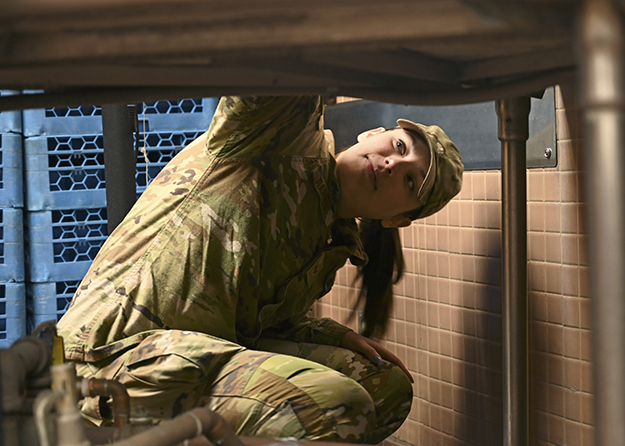JOINT BASE LEWIS-McCHORD - You never realize how bad you need a pest management professional until a battalion of ants march into your kitchen showing no signs of surrender.
Like any other community, the Air Force uses pest managers to combat those relentless pests, as well as provide additional crucial services to its installations.
Pest management airmen are trained to take the necessary action to control and prevent pest infestations. This is not limited to ants or a spider in your office. In addition to insects, rodents such as moles, racoons and mice can significantly impair operations on a military installation, especially considering the busy airfield at JBLM.
"We have three main focuses here when it comes to pest management," said U.S Air Force Senior Airman Valeria Hanson, 627th Civil Engineer Squadron pest management journeyman. "Taking care of our C-17's is the first."
Team McChord's fleet of 40 C-17 Globemaster III's travel around the world to various countries with differing rules and regulations. Aircraft landing in Italy for instance, must be sprayed prior to arrival to prevent the transfer of mosquitos that can potentially carry the Zika virus.
"Maintaining the airfield is another important task for us," Hanson said. "We spray it with insecticides every summer to repel insects that attract birds and other animals that can interfere with safe takeoffs and landings on the flightline."
Pest management specialists also maintain a lot of the facilities on base in accordance with Public Health guidelines.
"We work hand-in-hand with public health to make sure the dormitories, restaurants and eateries on base are operating at their best," Hanson said. "If something isn't functioning properly it can attract pests or rodents that cause further issues or carry diseases."
The pest management career field differs depending on the installation and geographic location.
"We are one of the few bases who work with the Directorate of Public Works, our Army civilian counterpart," said Staff Sgt. Matthew Rodriguez, pest management craftsman with the 627th CES. "So, from an administrative standpoint we do things differently here compared to an Air Force installation."
While one of the less glamorous jobs in the Air Force, pest management plays a fundamental role in the health and safety of all service members, Department of Defense civilians and their families.
Hanson entered the Air Force as an open-general recruit, meaning she didn't know what career field she was assigned until the near-end of basic military training.
"It's something I never would have thought of doing in the Air Force," Hanson said. "I was shocked when I got the job, but I am very happy with it and enjoy telling other people about it because they usually have never heard of it either."
To serve as a pest management specialist, applicants must have a valid state driver's license, normal color vision, be between the ages of 17 and 39, complete basic military training and have no record of claustrophobia or fear heights, insects, spiders, snakes or animals.
Contact your local recruiter to see if pest management is right for you.
To be featured in the Tough AF Jobs series, contact the 62nd Airlift Wing Public Affairs office at 62AW.PA.Mail@us.af.mil.





Read Comments